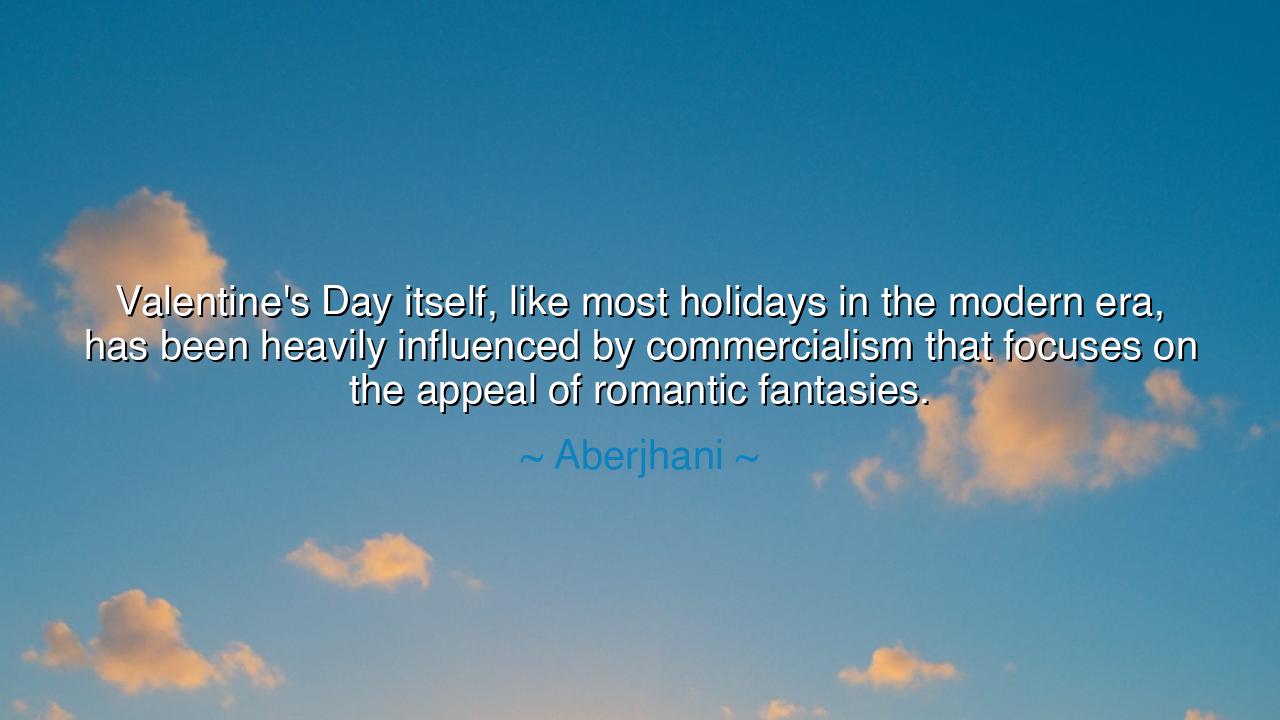
Valentine's Day itself, like most holidays in the modern era, has
Valentine's Day itself, like most holidays in the modern era, has been heavily influenced by commercialism that focuses on the appeal of romantic fantasies.






Listen, O children of wisdom, to the words of Aberjhani, who speaks of the great influence of commercialism on the way we perceive love and romantic holidays. He said, “Valentine’s Day itself, like most holidays in the modern era, has been heavily influenced by commercialism that focuses on the appeal of romantic fantasies.” In these words, Aberjhani calls upon us to recognize how the essence of holidays like Valentine’s Day, once centered on sincere expressions of love, has been distorted by the forces of commerce, turning it into a spectacle of superficial gestures. The true meaning of love, he suggests, is often overshadowed by the commercial machine, which promotes idealized romantic fantasies that may not reflect the deeper, more enduring nature of affection.
In the ancient world, holidays and festivals were deeply intertwined with the spiritual and cultural values of the people. Consider the Greek festivals of Panathenaea, held in honor of the goddess Athena, or the Roman Saturnalia, which celebrated the spirit of community and goodwill. These festivals were not merely about gifts or festivities, but about commemorating the shared values of society and reinforcing the bonds of community. Love, too, was celebrated, but it was often seen as part of a broader, more sacred understanding of human connection. Valentine’s Day, in its original form, was no different—it was a day of honoring the sanctity of love, and yet, like many other ancient traditions, it has evolved in the modern world into something that now serves commercial purposes.
In the modern world, the true meaning of holidays like Valentine’s Day has been diluted by the demands of the marketplace. Gifts of chocolates, roses, and greeting cards have become symbols of affection, but they are often more about meeting societal expectations than about true, heartfelt expressions of love. In this way, commercialism transforms what could be a deeply meaningful day into a transactional event, where love is measured by the material rather than the emotional. The romantic fantasy that is sold to us by advertisers—the idea that love is something to be celebrated with grand gestures and excess—does not reflect the reality of most relationships, which are built on quiet, everyday moments of connection, understanding, and support.
The realities of love are often more complex and far less glamorous than the fantasies depicted in the cards, gifts, and media of today. True love, as the great philosophers and poets of old taught, is about the sacrifice, the commitment, and the shared journey of two people who choose to walk through life together. Plato, in his work Symposium, explored the idea that love, or Eros, is not merely a desire for physical beauty, but a yearning for something deeper—the love of wisdom, of truth, and of the eternal soul. In this light, love is not about flowers and chocolates, but about the connection of souls and minds. The fantasy of romantic love that modern society presents to us distracts us from the deeper, more sacred truths about the nature of affection.
Consider, O children, the story of Heloise and Abelard, whose love was both passionate and tragic. Their relationship was not marked by lavish gifts or idealized gestures, but by deep intellectual connection and an unwavering bond that endured even through separation and suffering. Abelard, a brilliant philosopher, and Heloise, his equally brilliant student, shared a love that transcended the superficial. Their letters, filled with raw emotion and intellectual depth, reveal a love that was tested by time and hardship, yet remained true. Their story is a reminder that the deepest forms of love are not about grand gestures or material displays, but about mutual respect, commitment, and shared growth.
So, O children, the lesson here is clear: do not be swayed by the superficiality of modern romantic fantasies. The true essence of love is not found in the gifts or performances that the world markets to you, but in the quiet, steadfast connections you share with those you love. Love is not a commodity to be bought or sold, but a living, breathing force that must be nurtured with patience, understanding, and sacrifice. The world may tempt you with easy promises of happiness, but true joy in love comes from devotion, from time spent together, and from mutual care.
Thus, I say to you, O children: Celebrate love every day, not just on a holiday shaped by commerce. Let your love be defined by your actions, by the quiet support you give, by the sacrifices you make for each other, and by the truth you share. Do not measure your affection by the standards of commercialism, but by the depth of your connection. Love, in its purest form, is not something that can be bought—it is something that must be lived, and it is through the quiet moments of care and affection that the true beauty of love is revealed. Let your love be the kind that transcends the superficial and grows deeper with each passing day.






AAdministratorAdministrator
Welcome, honored guests. Please leave a comment, we will respond soon